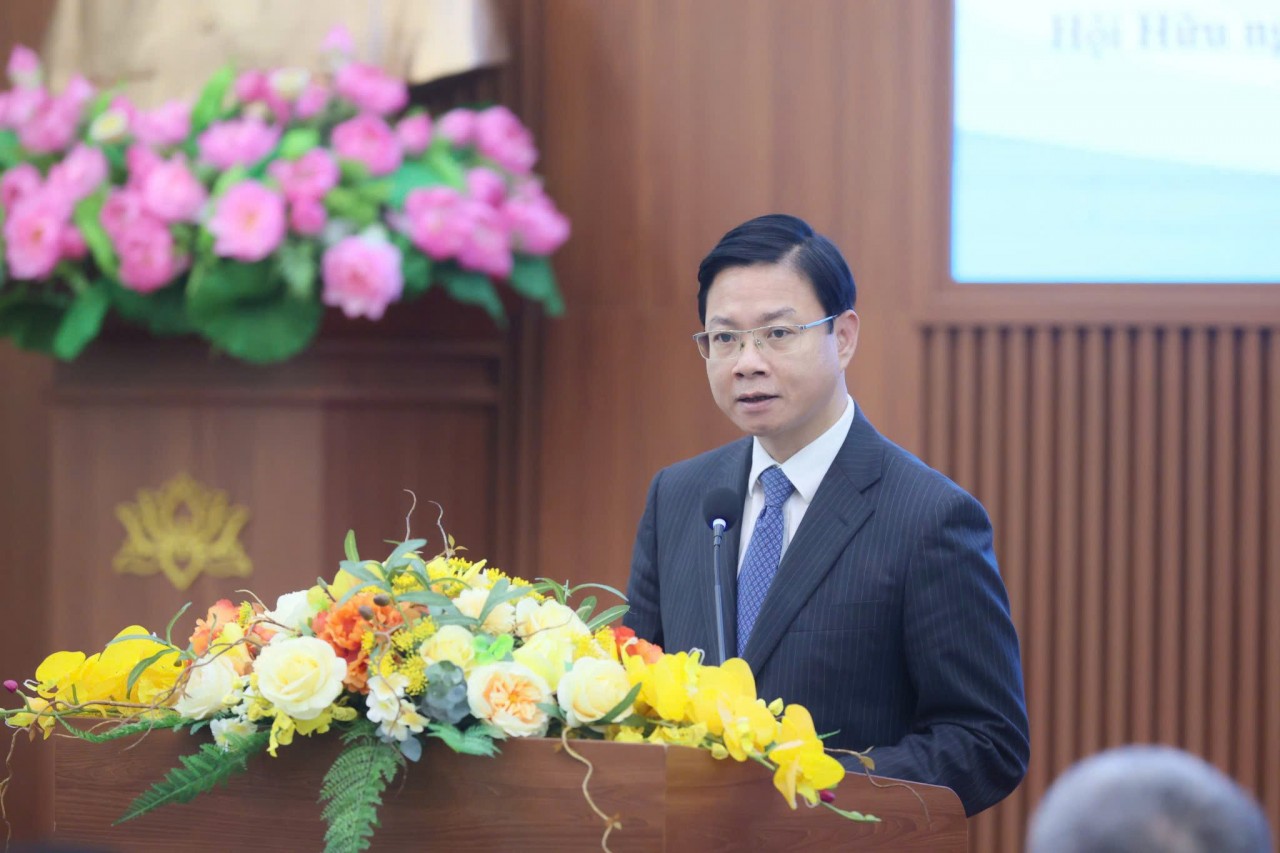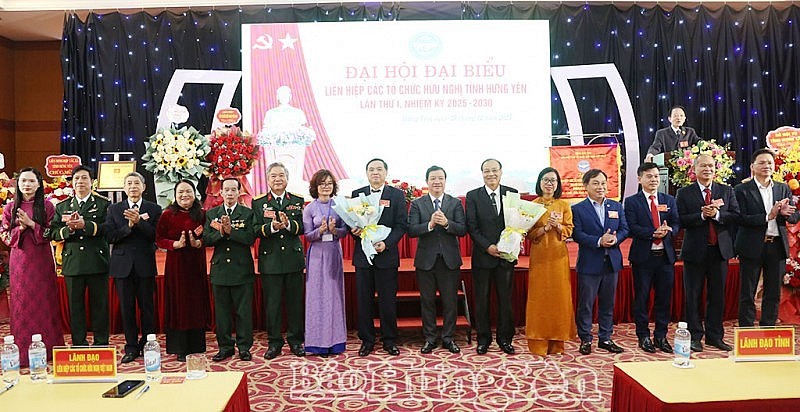Pham Quang Tu, Deputy Country Director of Oxfam in Vietnam:
Disaster Response Must Combine Emergency Relief with Sustainable Livelihood Recovery
| Almost 5.000 Flood-resistant Houses Built in 7 Vietnamese Provinces | |
| Save the Children Provides Disaster Response Solutions to Children and Communities |
- What are the key highlights of the Yagi Typhoon Recovery Project funded by Oxfam?
Pham Quang Tu: The most distinctive feature of the project is its comprehensive approach, covering the entire chain from emergency relief to post-disaster recovery and reconstruction. Typically, after a natural disaster, people require immediate support for essential needs to stabilize their lives. However, if we stop there, it’s not enough, because disasters often severely damage production and livelihoods, the long-term foundation of people's well-being.
Therefore, restoring livelihoods and rebuilding lives after a disaster is indispensable. Oxfam’s project was designed to encompass both phases.
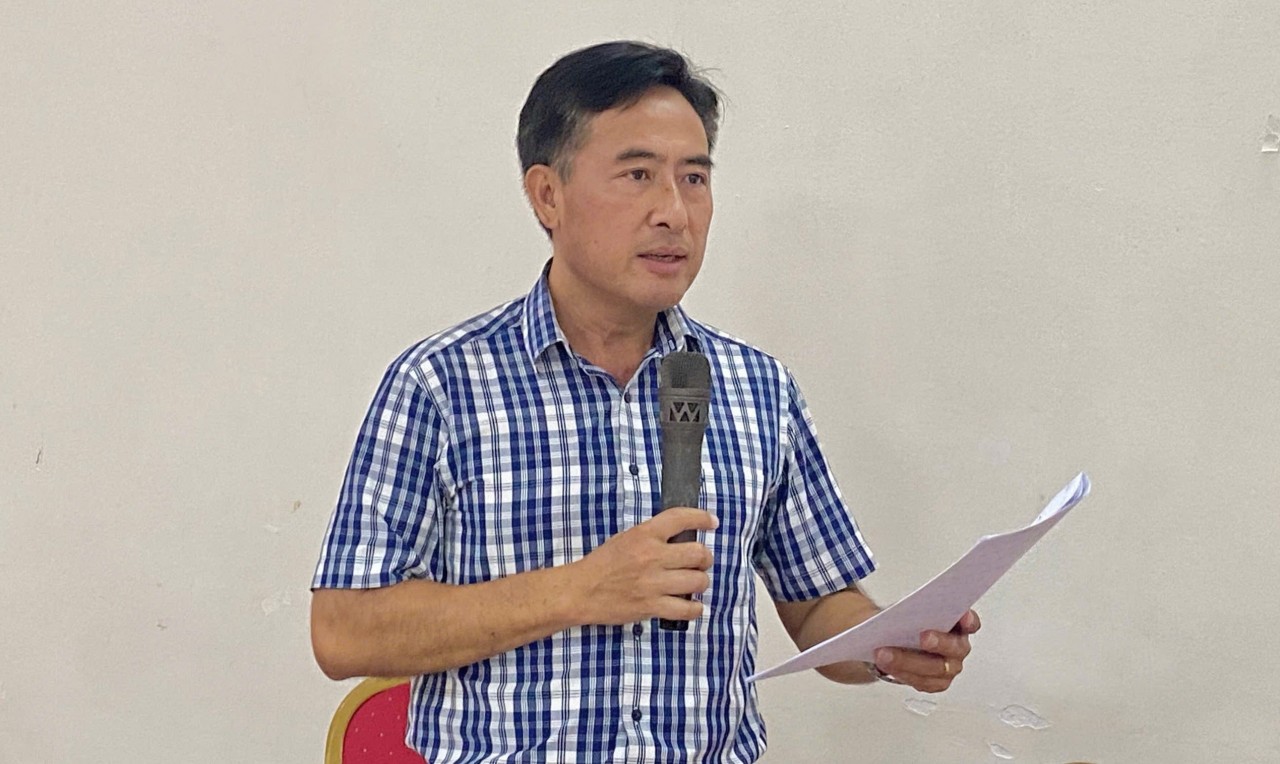 |
| Pham Quang Tu, Deputy Country Director of Oxfam in Vietnam, speaks at the closing workshop of the Typhoon Yagi Recovery Project funded by Oxfam, July 30, 2025. (Photo: Oxfam) |
- During the implementation of recovery activities in the three provinces of Lao Cai, Yen Bai, and Hoa Binh (now Lao Cai and Phu Tho), what priorities did Oxfam focus on to ensure sustainability in livelihood restoration?
Pham Quang Tu: In addition to common forms of support such as unconditional cash assistance, essential goods, hygiene kits, warm blankets, and cooking oil, Oxfam implemented two highly practical and impactful long-term activities:
First, the labor exchange model. After a storm, vital infrastructure for production, such as inter-village roads and irrigation canals, is often severely damaged. If not restored in time, farmers cannot prepare for the next crop. At the same time, post-disaster communities are typically overwhelmed and lack resources. Oxfam’s labor exchange model allows local people to participate in infrastructure repairs with their own labor and receive additional financial support. This not only contributes to restoring infrastructure but also provides them with income.
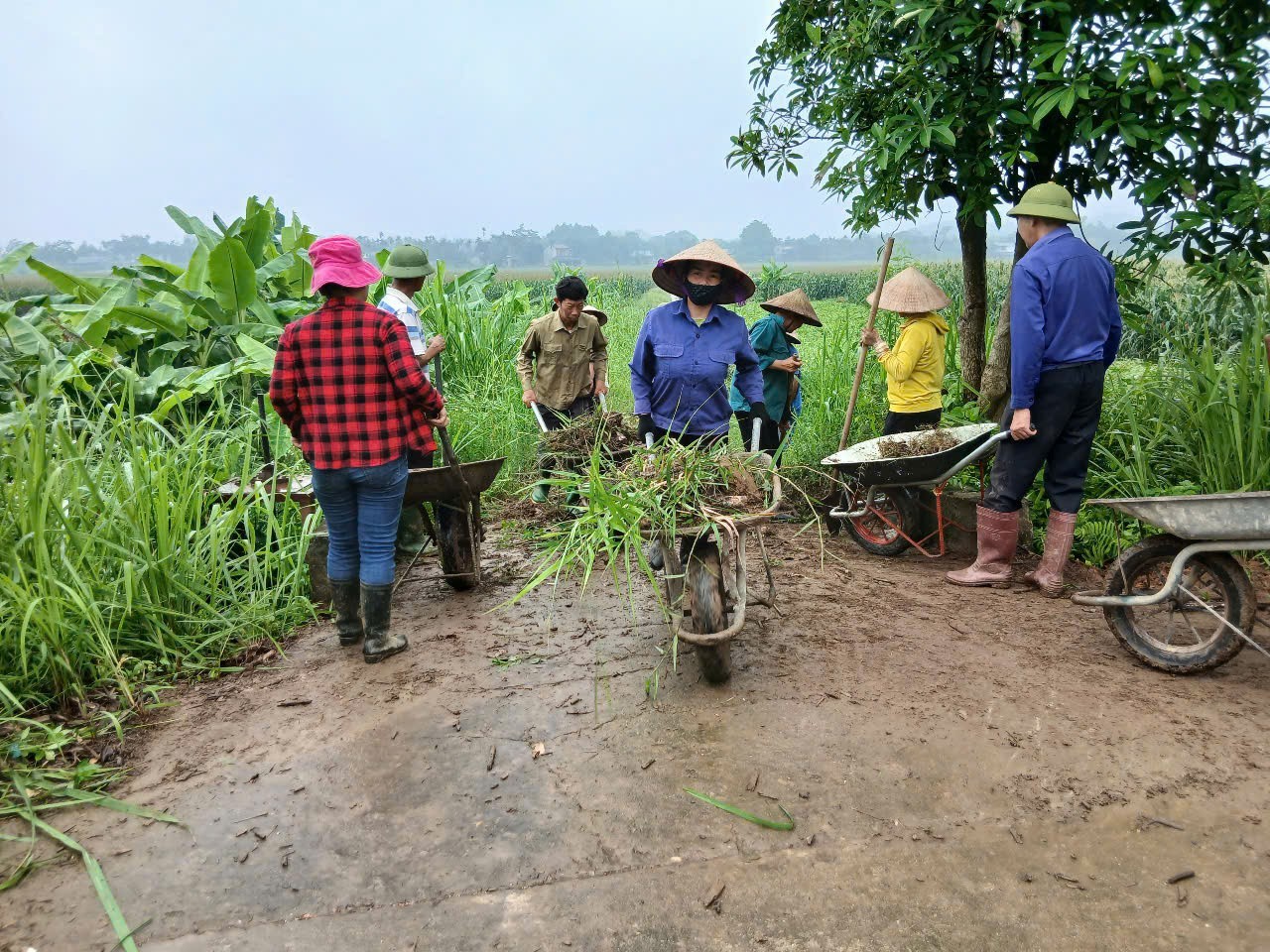 |
| Labor exchange activities generating income in the former Yen Bai province, now Lao Cai, implemented by Oxfam. (Photo: Oxfam) |
Second, support for reorganizing production. Many households lost all their seeds and breeding stock after the storm. Oxfam provided seeds, essential materials, and technical training to help residents sustainably recover their livelihoods.
- Based on Vietnam’s experience, in your view, what are the most important lessons in disaster response and recovery?
Pham Quang Tu: We have drawn three key lessons:
First, adopt a chain-based approach from emergency relief to livelihood recovery. These two phases must go hand in hand and not be treated separately. Only when livelihoods are stabilized can people truly recover from disasters.
| According to Oxfam’s report, the Typhoon Yagi Recovery Project, implemented in 15 communes across the former provinces of Lao Cai, Yen Bai, and Hoa Binh (now Lao Cai and Phu Tho), mobilized a total financial resource of nearly USD 1.5 million (equivalent to over VND 38 billion). By the end of July 2025, the project had supported more than 45,000 people, including: 1,858 unconditional cash grants (VND 3,000,000 per household), 1,210 conditional cash grants to support livelihood recovery, 3,210 water containers and hygiene kits prioritizing women’s and girls’ needs, 2,860 packages of cooking oil and warm blankets, 1,490 paid labor days for rehabilitating farmland, clearing irrigation canals, and improving rural roads. |
Second, ensure effective coordination among stakeholders: government authorities, civil society organizations, donors, and especially the local community. After Typhoon Yagi, there were many resources from the state, international donors, businesses, and charity groups. Without proper coordination, efforts could become overlapping and ineffective. Oxfam not only assessed the damage but also accurately identified the actual needs of the people and prioritized support based on those needs.
Third, policy reform regarding emergency aid regulations is needed. Vietnam already has a legal framework, such as Government Decree No. 50/2020/ND-CP on receiving, managing, and using international emergency aid for disaster relief and recovery, and Decree No. 80/2020/ND-CP on the management and use of non-refundable aid not classified as official development assistance. However, in practice, the process remains complicated and time-consuming.
For example, under Decree 50/2020/ND-CP, provincial People's Committees must seek input from multiple ministries before approving aid. Meanwhile, every day counts for people in storm-affected areas.
Together with Lao Cai, the former Yen Bai province was selected as one of the first two localities to implement the Typhoon Yagi Recovery Project funded by Oxfam. However, as the project content could not be included in the October 2024 Provincial People's Council meeting, it had to wait until the March 2025 session for budget approval, causing a delay until April 2025, much later than in Lao Cai. I believe such aid should be exempted from regular budget management procedures to allow for more flexible and timely implementation.
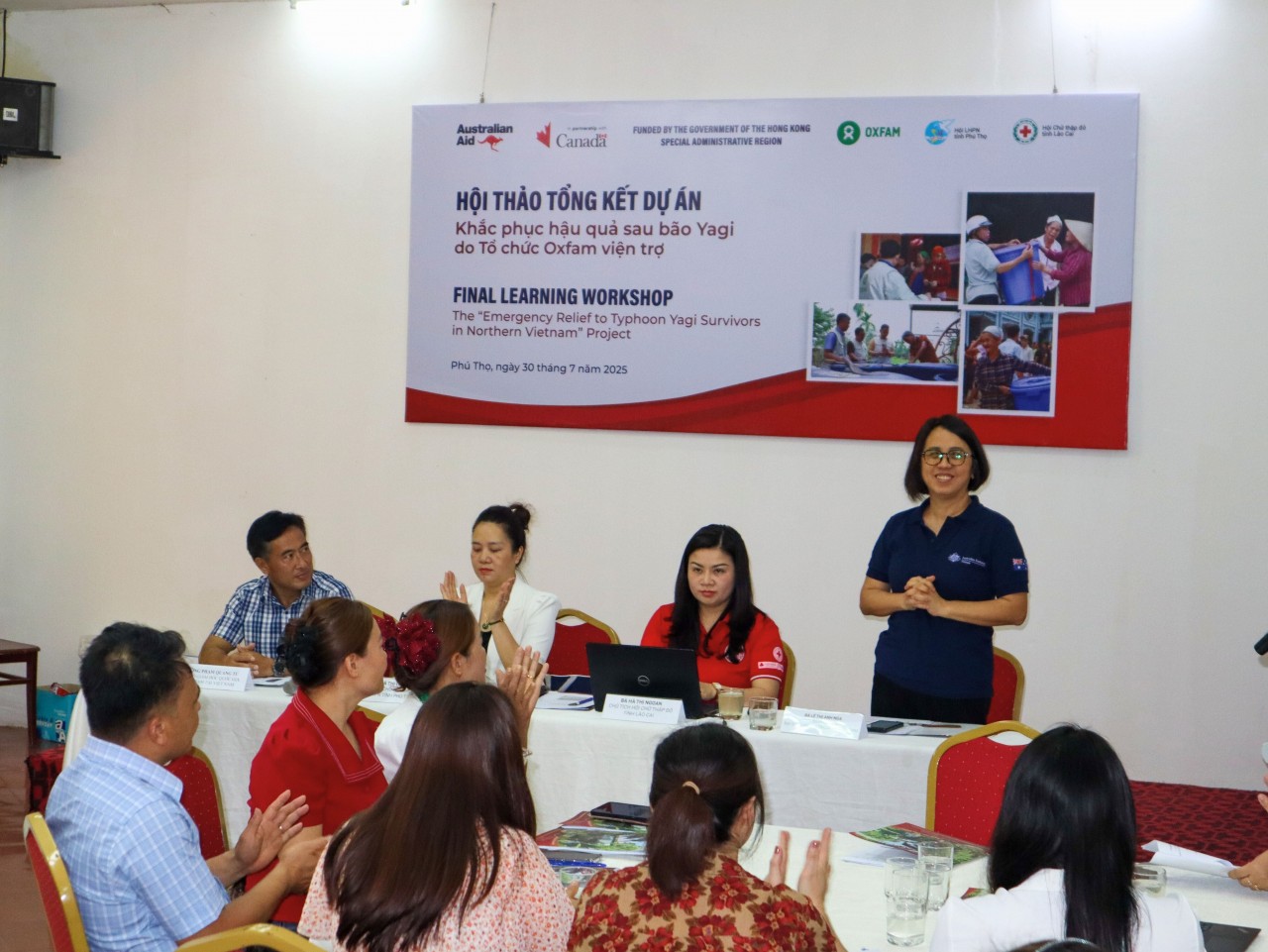 |
| The "Emergency Relief to Typhoon Yagi Survivors in Northern Vietnam" project. (Photo: Oxfam) |
- What are Oxfam’s plans for continuing to support Vietnamese localities in disaster response and sustainable development?
Pham Quang Tu: Since its establishment, humanitarian aid has always been Oxfam’s core mission. We will continue to work closely with all levels of government, mass organizations, civil society groups, and local communities to strengthen disaster prevention and risk reduction capacity.
Oxfam is currently an active member of the national Disaster Risk Reduction (DRR) Partnership. In addition to participating in feedback workshops, we regularly submit policy recommendations to relevant authorities.
Currently, after Typhoon Wipha caused severe damage in Nghe An, Oxfam is mobilizing resources to support the affected areas. We hope for timely and flexible coordination from the relevant agencies so that even modest aid can be maximized and not go to waste.
In times of disaster, the first efforts always come from the people and the State. But if external resources, such as those from international organizations, are used effectively, timely, and according to actual needs, their contributions can be tremendously valuable.
- Thank you very much!
| Opinions from delegates at the Typhoon Yagi Recovery Project Closing Workshop Do Thi Tuyen, former Chairwoman of the Red Cross Society of Y Can Commune, Tran Yen District, former Yen Bai Province (now Quy Mong Commune, Lao Cai Province): Among the three components of the project, we appreciated the unconditional cash assistance the most, as it allowed people to spend according to their specific needs and avoided duplication in relief goods. The labor exchange model not only generated income but also enhanced community bonding and helped restore essential infrastructure like irrigation canals after the storm. Additionally, agricultural training and the supply of materials supported farmers in transitioning to more suitable crops, improving their livelihoods sustainably. Tran Thi Phuong (formerly of Tuy Loc Commune, Yen Bai City, Yen Bai Province; now Nam Cuong Ward, Lao Cai Province): After a disaster, frontline workers like us face a lot of pressure during relief operations and often receive little attention. I hope organizations will pay more attention to the role and circumstances of grassroots staff.
Vu Viet Truong, former Chairman of the Red Cross Society of Lao Cai Province (former administrative boundary): We recommend that Oxfam and other organizations establish clear and quantifiable criteria to identify and communicate about women on the frontlines, many of whom hesitate to register as beneficiaries due to fear of social stigma. At the same time, we hope Oxfam will continue to accompany the province after the administrative merger and expand its support beyond disaster relief. We also propose revising Decree 50/2020/ND-CP to streamline the process of receiving international aid, cutting red tape, and shortening timelines to ensure timely assistance for disaster-affected communities. Vi Kim Ngan, former Chairman of the Red Cross Society of Bao Yen District, Lao Cai Province (former administrative boundary): Based on the practical implementation of the project, we have drawn five lessons for disaster response: Develop detailed annual disaster prevention plans starting from the commune level and strengthen the local Disaster Prevention and Control Committees; Review, list, and prepare relocation plans for households in high landslide risk areas; Effectively implement the “four on-the-spot” approach, especially in ensuring personnel, logistics, command, and equipment readiness; Enhance early warning systems for various types of natural disasters; Promote community-based communication and raise awareness on disaster prevention through regular training activities. |
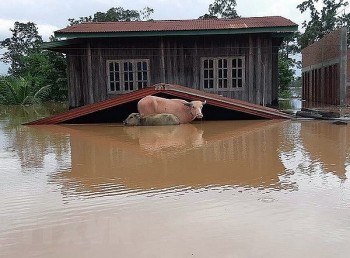 | Thousands of People in Vietnam to Improve Disaster Response Skills At the end of October 2021, the project was officially launched with the expectation of supporting more than 6,500 Vietnamese people to improve their skills ... |
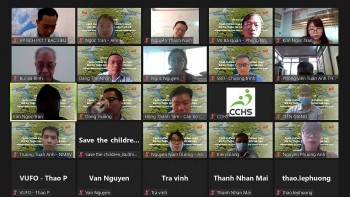 | NGOs Hold Seminar to Help Vietnam Strengthen Resilience To Climate Change Disasters The conference lies within the framework of the capacity-building project for locals to respond to natural disasters caused by climate change, funded by Bread for ... |
Recommended
 Expats in Vietnam
Expats in Vietnam
Vietnamese Tet - Where “Friends from Afar” Find a Sense of Belonging
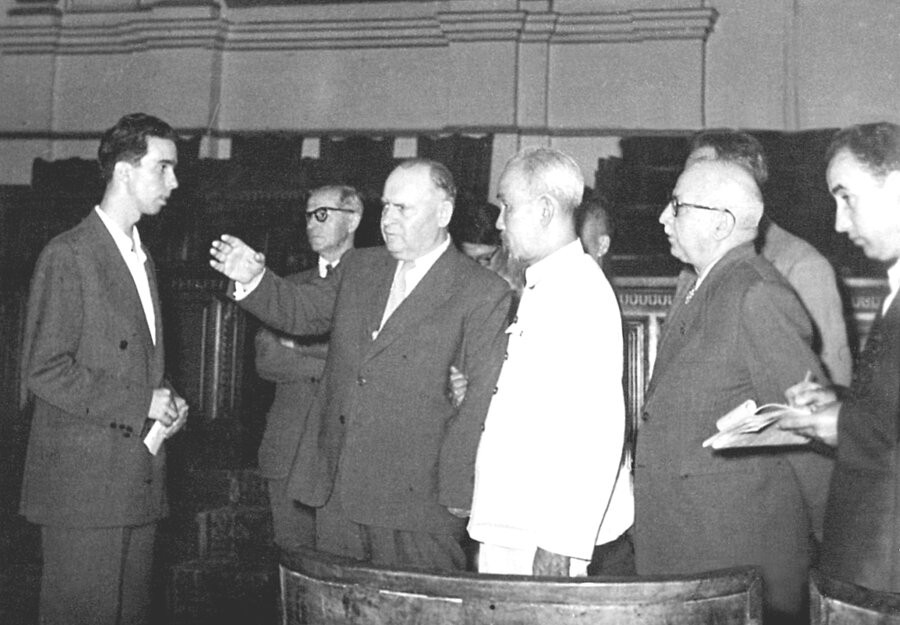 Viet's Home
Viet's Home
Ho Chi Minh’s Legacy in the Land of Roses - Bulgaria
 Viet's Home
Viet's Home
Vietnam Continues to Work with UNESCO to Safeguard Cultural Diversity in the Digital Era
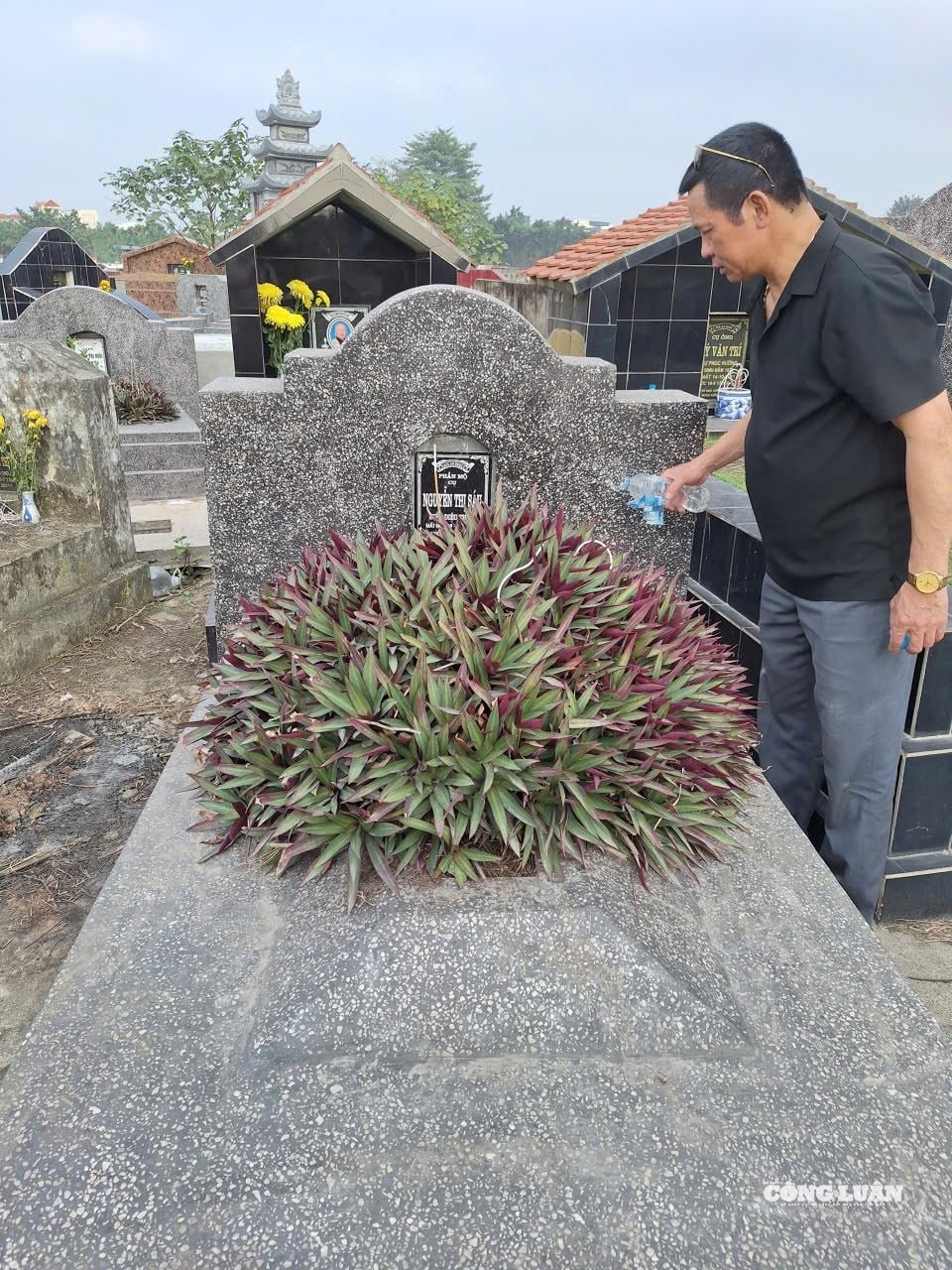 Viet's Home
Viet's Home
Inviting Ancestors Home for Tet
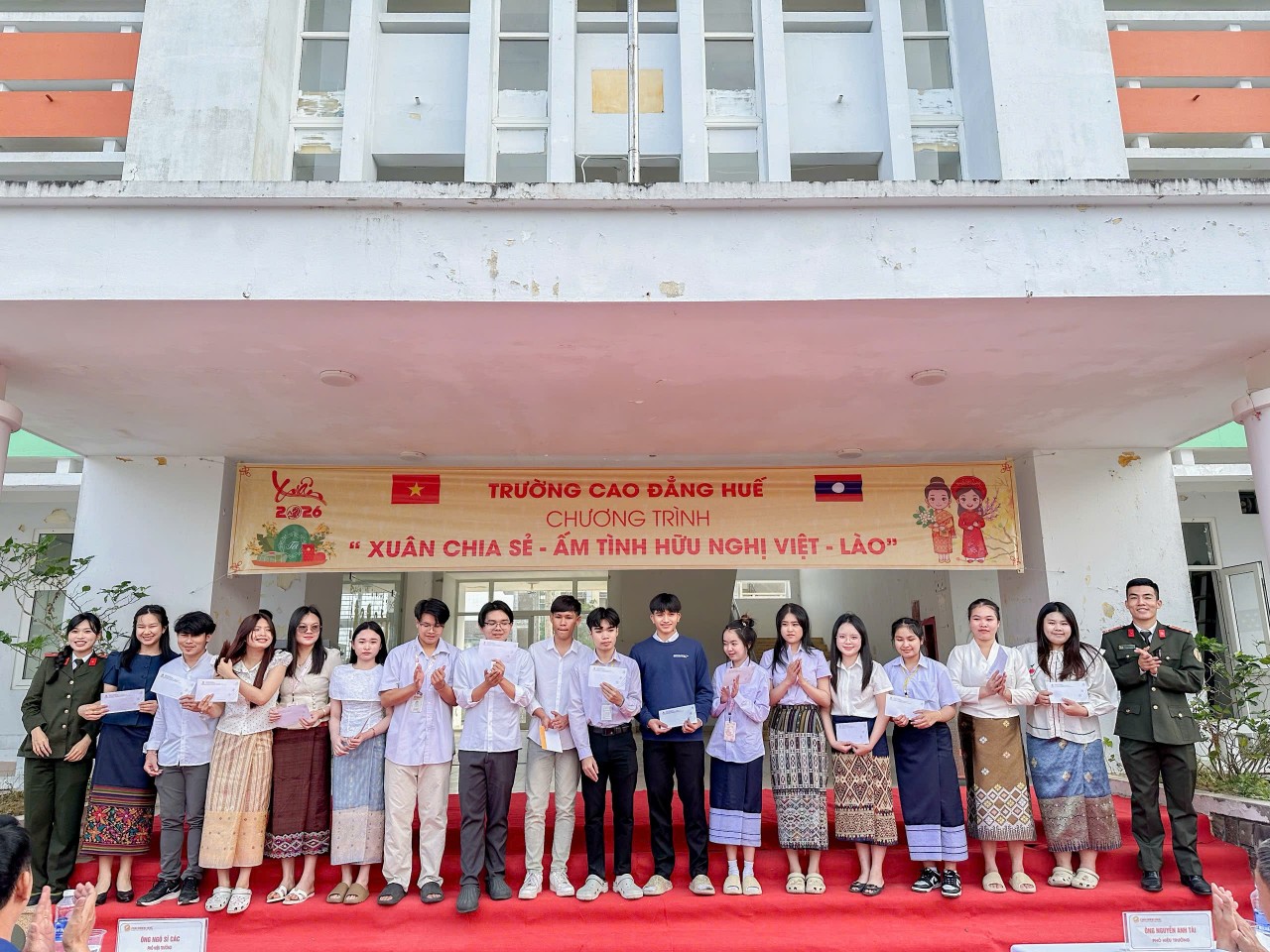 Viet's Home
Viet's Home
Universities In Vietnam Organize Tet Activities For International Students
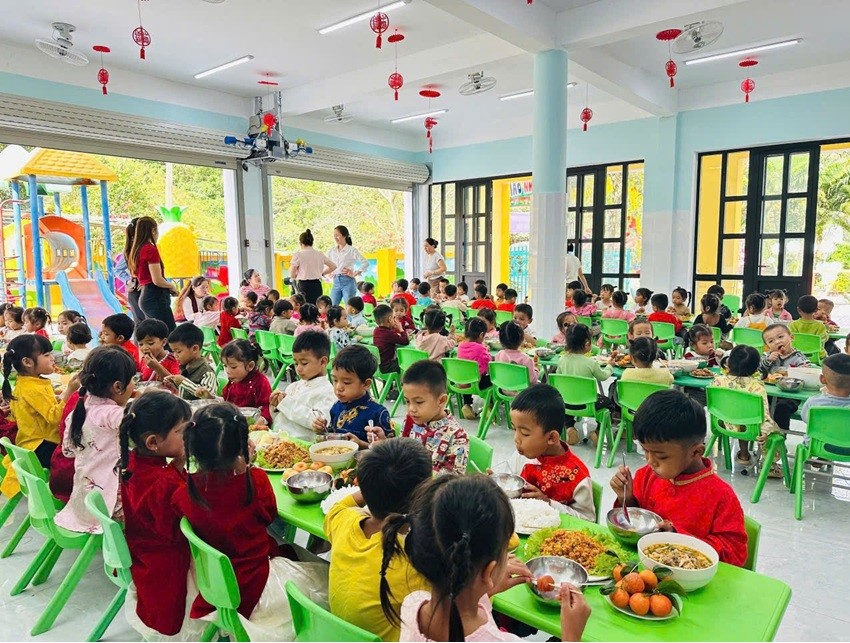 Viet's Home
Viet's Home
Zhi Shan Foundation Sent Tet gifts to Over 3,000 Children in Mountainous Region of Quang Tri
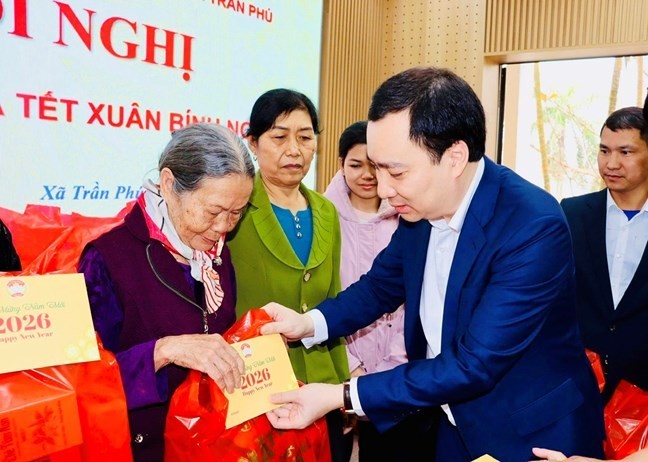 Viet's Home
Viet's Home
Hai Phong Brings Lunar New Year Gifts to Disadvantaged Families in Tran Phu Commune
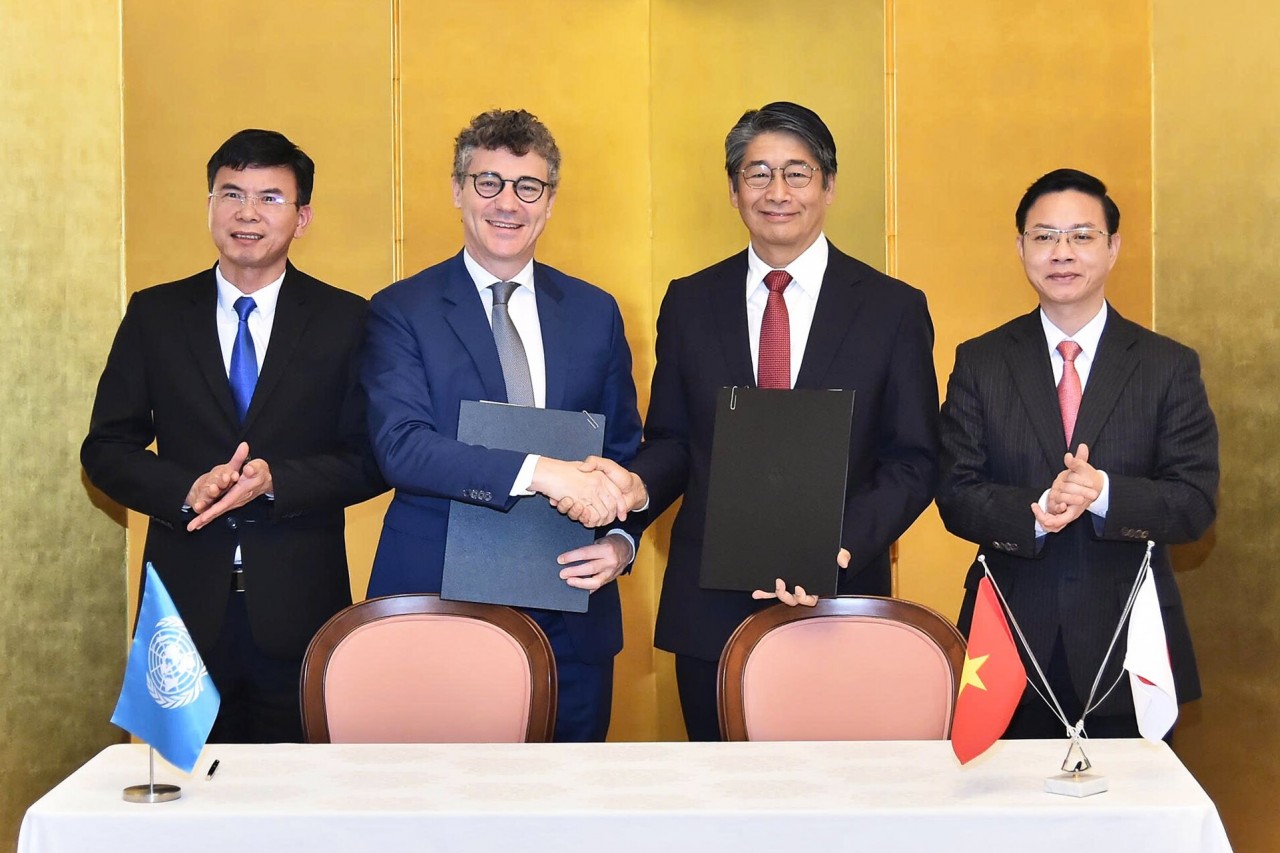 Viet's Home
Viet's Home

![Opinions from delegates at the Yagi Typhoon Recovery Project Closing Workshop Ms. Do Thi Tuyen, former Chairwoman of the Red Cross Society of Y Can Commune, Tran Yen District, former Yen Bai Province (now Quy Mong Commune, Lao Cai Province): Among the three components of the project, we appreciated the unconditional cash assistance the most, as it allowed people to spend according to their specific needs and avoided duplication in relief goods. The labor exchange model not only generated income but also enhanced community bonding and helped restore essential infrastructure like irrigation canals after the storm. Additionally, agricultural training and supply of materials supported farmers in transitioning to more suitable crops, improving their livelihoods sustainably. Ms. Tran Thi Phuong (formerly of Tuy Loc Commune, Yen Bai City, Yen Bai Province; now Nam Cuong Ward, Lao Cai Province): After a disaster, frontline workers like us face a lot of pressure during relief operations and often receive little attention. I hope organizations will pay more attention to the role and circumstances of grassroots staff. ![Mr. Vu Viet Truong speaking at the workshop. (Photo: Oxfam)] Mr. Vu Viet Truong, former Chairman of the Red Cross Society of Lao Cai Province (former administrative boundary): We recommend that Oxfam and other organizations establish clear and quantifiable criteria to identify and communicate about women on the frontlines—many of whom hesitate to register as beneficiaries due to fear of social stigma. At the same time, we hope Oxfam will continue to accompany the province after the administrative merger and expand its support beyond disaster relief. We also propose revising Decree 50/2020/ND-CP to streamline the process of receiving international aid, cutting red tape, and shortening timelines to ensure timely assistance for disaster-affected communities. Mr. Vi Kim Ngan, former Chairman of the Red Cross Society of Bao Yen District, Lao Cai Province (former administrative boundary): Based on the practical implementation of the project, we have drawn five lessons for disaster response: Develop detailed annual disaster prevention plans starting from the commune level and strengthen the local Disaster Prevention and Control Committees; Review, list, and prepare relocation plans for households in high landslide risk areas; Effectively implement the “four on-the-spot” approach, especially in ensuring personnel, logistics, command, and equipment readiness; Enhance early warning systems for various types of natural disasters; Promote community-based communication and raise awareness on disaster prevention through regular training activities. Opinions from delegates at the Yagi Typhoon Recovery Project Closing Workshop Ms. Do Thi Tuyen, former Chairwoman of the Red Cross Society of Y Can Commune, Tran Yen District, former Yen Bai Province (now Quy Mong Commune, Lao Cai Province): Among the three components of the project, we appreciated the unconditional cash assistance the most, as it allowed people to spend according to their specific needs and avoided duplication in relief goods. The labor exchange model not only generated income but also enhanced community bonding and helped restore essential infrastructure like irrigation canals after the storm. Additionally, agricultural training and supply of materials supported farmers in transitioning to more suitable crops, improving their livelihoods sustainably. Ms. Tran Thi Phuong (formerly of Tuy Loc Commune, Yen Bai City, Yen Bai Province; now Nam Cuong Ward, Lao Cai Province): After a disaster, frontline workers like us face a lot of pressure during relief operations and often receive little attention. I hope organizations will pay more attention to the role and circumstances of grassroots staff. ![Mr. Vu Viet Truong speaking at the workshop. (Photo: Oxfam)] Mr. Vu Viet Truong, former Chairman of the Red Cross Society of Lao Cai Province (former administrative boundary): We recommend that Oxfam and other organizations establish clear and quantifiable criteria to identify and communicate about women on the frontlines—many of whom hesitate to register as beneficiaries due to fear of social stigma. At the same time, we hope Oxfam will continue to accompany the province after the administrative merger and expand its support beyond disaster relief. We also propose revising Decree 50/2020/ND-CP to streamline the process of receiving international aid, cutting red tape, and shortening timelines to ensure timely assistance for disaster-affected communities. Mr. Vi Kim Ngan, former Chairman of the Red Cross Society of Bao Yen District, Lao Cai Province (former administrative boundary): Based on the practical implementation of the project, we have drawn five lessons for disaster response: Develop detailed annual disaster prevention plans starting from the commune level and strengthen the local Disaster Prevention and Control Committees; Review, list, and prepare relocation plans for households in high landslide risk areas; Effectively implement the “four on-the-spot” approach, especially in ensuring personnel, logistics, command, and equipment readiness; Enhance early warning systems for various types of natural disasters; Promote community-based communication and raise awareness on disaster prevention through regular training activities.](https://vietnamtimes.thoidai.com.vn/stores/news_dataimages/2025/072025/31/16/e55f8535ee2143b85024a8fa8685709f.jpg?rt=20250731161922)
